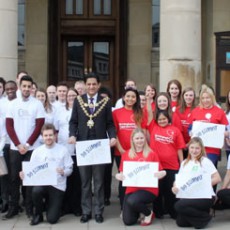- October 9th, 2014
- Author: Maria Mcleod
- Category: Uncategorised
Research and Development at Birmingham Women’s is big business, recently nominated for a national award, we are helping to improve treatment and care for patients locally and globally.
Birmingham Mother of two, Lynne Poole has nothing but gratitude to Birmingham Women’s for the safe delivery of her eldest child, Eve, now 3, who was born 16 weeks early after Lynne went into premature labour.
When she was expecting her first child, Lynne from South Yardley, joined a research trial at the Women’s entitled OPTIMUM which was treating women with progesterone who were at a higher risk of premature labour. As a result of taking part, Lynn was aware of the signs when she herself went into premature labour.
Lynne is convinced that had she not been able to tell the signs, then the outcome may have been very different, “Because I joined the research trial, I was aware that I was at a higher risk of premature labour. When I started getting twinges, I thought, I can’t dismiss this, and I went to the Women’s. The next day, Eve was born at just 24 weeks. Had I not been on the trial, I may have dismissed the early signs.”
Eve is now a happy and healthy 3 year old and Lynne now has a 5 month old son, Harry.
Research and Development (R&D) is an important part of the work that we do at the Women’s and we are one of the top performing specialist Trusts in the country for R&D, both locally, nationally and internationally. R&D has a direct impact on our patients in all our specialties of Maternity, Gynaecology, Neonatology and Genetics. In the last year we have been involved with 52 projects of which 22 have been developed by the Women’s Hospital, with over 2700 patients taking part.
The R&D Team has been shortlisted for this year’s prestigious Health Service Journal Award in the category of Clinical Research Impact and we have had a bumper year in terms of recognition for the impact that our Research has had, locally and globally.
Did you know that research developed at Birmingham Women’s has led to the following:
- A test for heart disease in newborn baby by measuring the oxygen levels before discharge may save many tiny lives. After reviewing the study from BWH the USA has recommended that all babies be screened in this way and the UK National Screening Committee has recently recommended pinot studies across the UK. The Pulse Ox Test has already been taken on in many other countries across the world.
- A study of medical treatment versus the use of a simple contraceptive device for the treatment of heavy periods has had a major impact in changing clinical practice in the UK and is proving a huge benefit to women.
- A trial of laser therapy for identical twins whilst still in the womb to help reduce significant adverse effects developed at the Women’s Hospital has resulted in this now being routine practice.
In a recent UK publication ‘NHS Health & Wealth Innovations’ 14 out of the 108 listed innovations were developed in the Regional Genetics Laboratory at Birmingham Women’s - Research from Birmingham Women’s examining care to women during pregnancy in developing countries was recently included in recommendations by the World Health Organisation
These are just a few examples of the important research which is being carried out on a day to day basis at the Women’s by doctors, midwives, nurses, therapists and scientists.
Research and Development Lead and Consultant Neonatologist, Dr Andy Ewer, who developed the Pulse Ox Test commented, “We are really passionate about Research, which we believe is everybody’s business. We are very fortunate to work with some highly talented academics and NHS staff. We are dedicated to improving the service we provide to our patients by promoting research culture throughout our hospital.”
For further information contact:
Vicki Davies or Maria Mcleod
Communications Birmingham Women’s Hospital
Email: [email protected]
Phone: 0121 623 6984/07870 587759
Web:http://www.bwnft.nhs.uk
Note to Editors:
Birmingham Women’s NHS Foundation Trust provides a range of health care services to women and families across the West Midlands and further afield.
We treat 50,000 people a year, carry out 3,000 operations and test 50,000 genetic samples. More than 8,000 babies were born under our care last year, making our maternity unit one of the busiest in the country.
We provide a full range of gynaecological, maternity and neonatal care as well as a comprehensive genetics service. Our fertility centre is one of the most successful in the country and our fetal medicine centre which provides care for the unborn baby and women during pregnancy receives referrals from across the region and further afield.










